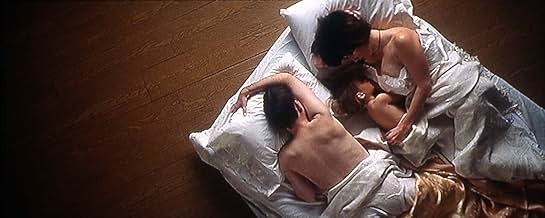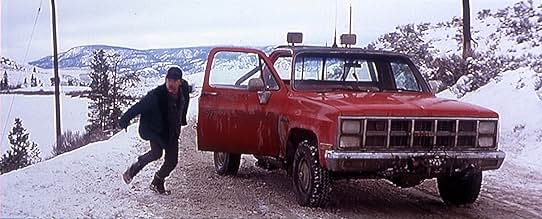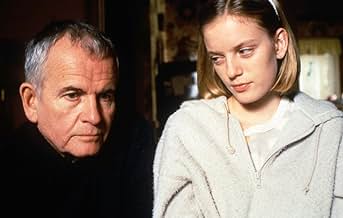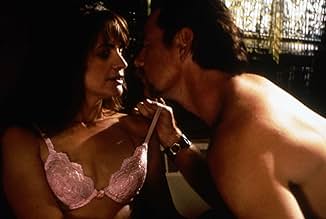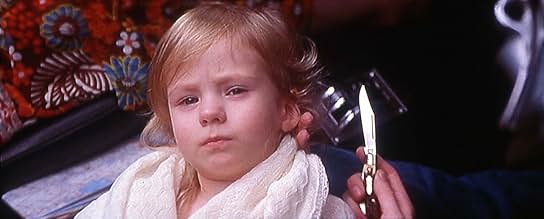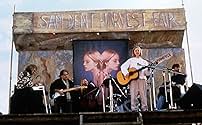A bus crash in a small town brings a lawyer to defend the families, but he discovers everything isn't what it seems.A bus crash in a small town brings a lawyer to defend the families, but he discovers everything isn't what it seems.A bus crash in a small town brings a lawyer to defend the families, but he discovers everything isn't what it seems.
- Nominated for 2 Oscars
- 34 wins & 56 nominations total
- Director
- Writers
- All cast & crew
- Production, box office & more at IMDbPro
Featured reviews
... of not knowing what's behind closed doors, that leads us to hope nothing other than normal is going on behind them - whatever normal is. In this case no optimism, which I don't think is normal, there's always optimism, there's always a shade of hope, whether you choose to grab hold of it or not.
You could take a bus full of school children on any given day, in any part of the world, and observe the chaos that results after an appalling accident similar to the one presented here - but few outcomes would be the same after the despair, loss, rage and anger have subsided, and nobody would suggest it was fate. It is however, a beautifully performed picture, it leaves you reflective and thoughtful about the lives of the characters, how they became who they are and what they will become as a result. I don't buy the loss as a metaphor for the loss of the nostalgic view of the childhood of yesteryear either - that metaphor should be a celebration of opportunity. I would not want to curse myself with the childhood of my parents or similarly do the same to my own children.
You could take a bus full of school children on any given day, in any part of the world, and observe the chaos that results after an appalling accident similar to the one presented here - but few outcomes would be the same after the despair, loss, rage and anger have subsided, and nobody would suggest it was fate. It is however, a beautifully performed picture, it leaves you reflective and thoughtful about the lives of the characters, how they became who they are and what they will become as a result. I don't buy the loss as a metaphor for the loss of the nostalgic view of the childhood of yesteryear either - that metaphor should be a celebration of opportunity. I would not want to curse myself with the childhood of my parents or similarly do the same to my own children.
When it comes to drama, The Sweet Hereafter represents the finest cinema of the decade. The film lifts the director Atom Egoyan to the highest place of Canadian directors -right next to David Cronenberg. With extraordinary intelligence, Egoyan -the maker of "Exotica"- creates labyrinths of relationships. Brilliantly using flashbacks the director reveals the emotions of the characters to the viewers -a powerful way to make the audience feel anxiety.
The Sweet Hereafter is based on a novel by Russell Banks. This doesn't mean that Egoyan hasn't created a film that looks like his own creation. Very beautifully, even with a sense of poetry, the camera moves in a canadian small-town, a scenery full of snow. The nicely unusual music of Mychael Danna creates the mood when a lawyer played by Ian Holm arrives to the town. A School bus lies under ice, and the lawyer is invited to sue someone for the loss of several children.
A very important slice of the scenario belongs to a school girl (Sarah Polley), who realizes that the grief of loss can't be eased by judging the cause of it. Also the other people of the town play a remarkable role in the script.
Egoyan speaks clearly, but with a sound of personality, about the need of love, the pain of loneliness and the crossing of emotional obstacles. Fortunately someone knows how to direct interesting movies with elements of drama in them. The Sweet Hereafter possesses a brilliant structure where the visual telling breaths in the spirit of symbolism. I'm a very demanding viewer, a true cynic who always tries to find the worst sides of the film, but in this case I can't say anything negative.
The Sweet Hereafter is based on a novel by Russell Banks. This doesn't mean that Egoyan hasn't created a film that looks like his own creation. Very beautifully, even with a sense of poetry, the camera moves in a canadian small-town, a scenery full of snow. The nicely unusual music of Mychael Danna creates the mood when a lawyer played by Ian Holm arrives to the town. A School bus lies under ice, and the lawyer is invited to sue someone for the loss of several children.
A very important slice of the scenario belongs to a school girl (Sarah Polley), who realizes that the grief of loss can't be eased by judging the cause of it. Also the other people of the town play a remarkable role in the script.
Egoyan speaks clearly, but with a sound of personality, about the need of love, the pain of loneliness and the crossing of emotional obstacles. Fortunately someone knows how to direct interesting movies with elements of drama in them. The Sweet Hereafter possesses a brilliant structure where the visual telling breaths in the spirit of symbolism. I'm a very demanding viewer, a true cynic who always tries to find the worst sides of the film, but in this case I can't say anything negative.
This was one of the saddest films I have ever seen. I do not mean that in bad way though. I have seen sad films that made me depressed and I usually disliked them because of this. The Sweet Hereafter is different though. It is a sad film without being manipulative and fake. The film brilliantly shows how people need to have revenge. After a bus accident where all but two are killed the people of the town, after a lawyer pushes them on, become obsessed with suing those responsible. Egoyan looks at how people can not accept that things happen by accident. The people of the town feel that someone has to pay for the pain they are feeling and in the end they are the ones to pay for it. The acting is excellent, especially Ian Holm. Once you become accustomed to the time shifts this is an incredibly rewarding film that you will always remember.
I re-watched The Sweet Hereafter on video last night, and am still haunted by it today. It is structured so that you know some of the basic tragic plot near the beginning. This caused my eyes to water at some of the beautiful lyrical overhead tracking shots of the school bus winding through the snow covered roads of the Pacific northwest.
The film switches between the time that the lawyer arrives in town to "help" the families receive compensation, and to days just prior to the accident. We witness a loving "hippie" couple who has adopted a beautiful Native American boy, a loving mother of a school phobic learning disabled boy, and a widower who loves his two children a great deal and sees them off to school by following them in his truck. This same widower is having an affair with the mother of the school phobic--she is unhappily married to a "pig" of a husband. Complicating matters is the father who obviously loves his teenage daughter in Lolita-like fashion.
Part of the theme of The Sweet Hereafter is similar to Magnolia--accidents do happen--perhaps no one at fault... or perhaps all the adults had some part in it without anyone being at fault, as only the innocent children were killed.
The town had changed... tragedy has taken away the town's joy and innocence. The parents are no longer open with each other, but guarded, suspicious... in deep grief.
The lawyer is little more than an ambulance chaser, attempting to profit off their tragedy. Yet, he, too is a tragic figure who has already "lost" his daughter--
He had saved her when she was a baby, yet she has now turned away from him... and his feelings are now ambivalent towards her--he is a grief-stricken, defeated father, who vascillates between wanting to talk with his daughter on his cell phone and deciding to cut her off.
The story of the Pied Piper is interweaved between various events in the movie to give greater depth to the story. There's also a great scene in the movie between the lawyer and the garage mechanic, who has lost his two children, that shows that the theme is much broader than the literal story:
"I'm telling you this because... we've all lost our children, Mr. Ansel. They're dead to us. They kill each other in the streets. They wander comatose in shopping malls. They're paralyzed in front of televisions. Something terrible has happened that's taken our children away. It's too late. They're gone."
This movie isn't for everyone. It's a serious, layered piece with a lot of melancholy. The kind of fare that film critics can love, but Academy voters will avoid. But what it strives to accomplish is done very well. And it will stay with you long after the final scenes have appeared.
The film switches between the time that the lawyer arrives in town to "help" the families receive compensation, and to days just prior to the accident. We witness a loving "hippie" couple who has adopted a beautiful Native American boy, a loving mother of a school phobic learning disabled boy, and a widower who loves his two children a great deal and sees them off to school by following them in his truck. This same widower is having an affair with the mother of the school phobic--she is unhappily married to a "pig" of a husband. Complicating matters is the father who obviously loves his teenage daughter in Lolita-like fashion.
Part of the theme of The Sweet Hereafter is similar to Magnolia--accidents do happen--perhaps no one at fault... or perhaps all the adults had some part in it without anyone being at fault, as only the innocent children were killed.
The town had changed... tragedy has taken away the town's joy and innocence. The parents are no longer open with each other, but guarded, suspicious... in deep grief.
The lawyer is little more than an ambulance chaser, attempting to profit off their tragedy. Yet, he, too is a tragic figure who has already "lost" his daughter--
He had saved her when she was a baby, yet she has now turned away from him... and his feelings are now ambivalent towards her--he is a grief-stricken, defeated father, who vascillates between wanting to talk with his daughter on his cell phone and deciding to cut her off.
The story of the Pied Piper is interweaved between various events in the movie to give greater depth to the story. There's also a great scene in the movie between the lawyer and the garage mechanic, who has lost his two children, that shows that the theme is much broader than the literal story:
"I'm telling you this because... we've all lost our children, Mr. Ansel. They're dead to us. They kill each other in the streets. They wander comatose in shopping malls. They're paralyzed in front of televisions. Something terrible has happened that's taken our children away. It's too late. They're gone."
This movie isn't for everyone. It's a serious, layered piece with a lot of melancholy. The kind of fare that film critics can love, but Academy voters will avoid. But what it strives to accomplish is done very well. And it will stay with you long after the final scenes have appeared.
The Sweet Hereafter is as tragic, sad and matter-of-fact as movies get, but it's still so very beautiful that it becomes a film that's virtually impossible to forget.
The story makes no secret of the fact what terrible tragedy will happen, right from the outset. A lesser filmmaker than Atom Egoyan would've jumped at the chance to shock the audience with the freak accident that robs the town of Sam Dent of nearly all their children, by telling the story in a linear fashion. Not Egoyan. The story is fragmented, thus enhancing the true point: This is not about the overwhelming power of loss, it is about the overwhelming power of survivor's guilt (nicely represented in Browning's poem The Pied Piper Of Hamelin, which is referred to in the movie). It's all about people who grieve not only for the ones they've lost, but also for themselves, how empty their lives have become because of their tragedies. In focussing on that point, the film refrains from manipulative sentiment (which so many others don't), and presents true and unintrusive emotion, that, in the end, despite all the terror, shines a light of hope, for the sweet hereafter is not only the peaceful afterlife, it's also the peaceful future, the continuation of life...
The performances speak for themselves. Ian Holm and Sarah Polley shine in particular, through nicely subdued and subtle acting. Polley also excels as a fantastic singer-songwriter. The songs in the movie were written and performed all by herself.
Egoyan's direction is simply masterful in its beauty, elegance and evocation.
One of the best films of the 1990s.
10 out of 10.
The story makes no secret of the fact what terrible tragedy will happen, right from the outset. A lesser filmmaker than Atom Egoyan would've jumped at the chance to shock the audience with the freak accident that robs the town of Sam Dent of nearly all their children, by telling the story in a linear fashion. Not Egoyan. The story is fragmented, thus enhancing the true point: This is not about the overwhelming power of loss, it is about the overwhelming power of survivor's guilt (nicely represented in Browning's poem The Pied Piper Of Hamelin, which is referred to in the movie). It's all about people who grieve not only for the ones they've lost, but also for themselves, how empty their lives have become because of their tragedies. In focussing on that point, the film refrains from manipulative sentiment (which so many others don't), and presents true and unintrusive emotion, that, in the end, despite all the terror, shines a light of hope, for the sweet hereafter is not only the peaceful afterlife, it's also the peaceful future, the continuation of life...
The performances speak for themselves. Ian Holm and Sarah Polley shine in particular, through nicely subdued and subtle acting. Polley also excels as a fantastic singer-songwriter. The songs in the movie were written and performed all by herself.
Egoyan's direction is simply masterful in its beauty, elegance and evocation.
One of the best films of the 1990s.
10 out of 10.
Did you know
- TriviaAs indicated on writer and director Atom Egoyan's commentary track on the DVD, many people ask about the odd mask worn by the notetaker during the deposition scene. This is a stenographer's mask, an item which is used in real life by a stenographer to record his or her own voice during the deposition.
- GoofsWhen Stephens visits the Ottos, and Mr. Otto offers him some tea, we hear a tea kettle whistling but the one we see on the wood stove is not the whistling type, and there is no steam coming from the kettle.
- Quotes
Mitchell Stephens: You'd make a good poker player, kid.
- SoundtracksOne More Colour
Words and Music by Jane Siberry
Courtesy of Wing in Music/Red Sky Music
Arranged by Mychael Danna
Vocal by Sarah Polley
Performed by The Sam Dent Band
- How long is The Sweet Hereafter?Powered by Alexa
Details
Box office
- Budget
- CA$5,000,000 (estimated)
- Gross US & Canada
- $3,263,585
- Opening weekend US & Canada
- $31,149
- Oct 12, 1997
- Gross worldwide
- $3,263,585
- Runtime
- 1h 52m(112 min)
- Color
- Sound mix
- Aspect ratio
- 2.35 : 1
Contribute to this page
Suggest an edit or add missing content


